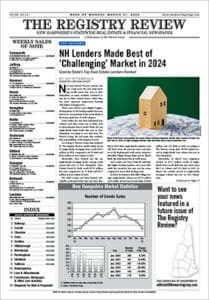
The state legislature is considering whether to require banks to go through the courts when a borrower defaults on their mortgage. Advocates say it will be less expensive for banks, a claim the state’s baking industry trade group disputes.
Attorney Terrie Harman saw a trend with several of her clients: They had lost their homes to foreclosure auctions without receiving notice from the lender.
As their cases went through New Hampshire’s court system, she learned the state’s foreclosure law required lenders to send notification through certified mail. But the law said nothing about receiving the mail.
“The law is defective in my opinion – not good for borrowers – because the law does not require the borrower to receive that certified mail,” Harman said.
Harman turned to the New Hampshire legislature, and in February, the state House of Representatives passed a bill that would change the process for mortgage foreclosures. If approved by the New Hampshire Senate, the proposed legislation would require lenders to begin a foreclosure with a civil action in Superior Court, known as judicial foreclosure.
Those opposing the bill include the New Hampshire Bankers Association. Mark Pitkin is chair of the NH Bankers board and president and CEO of Sugar River Bank in Newport. He sees judicial foreclosure as an unnecessary step that will increase costs for all bank consumers.
“We as a community bank – and from what I hear from many other community banks – have never really had an issue that would warrant the necessity of judicial foreclosure,” Pitkin said.
The state had 7,555 foreclosures of single-family homes and 930 condominium foreclosures between 2015 and 2019, according to data compiled by The Warren Group, publisher of The Registry Review. The annual numbers have decreased in recent years, from 2,326 single-family homes foreclosed in 2015 to 1,546 in 2018. Condominium foreclosures went from 297 in 2015 to 181 in 2015.
Supporters: Borrowers Need Protection
Harman said her clients did not try to evade foreclosure notices. In one case the homeowner did not receive the registered mail because he was away taking care of his elderly father, Harman said.
Though she had no lobbying experience, Harman went to the legislature three years ago to start advocating for changes to New Hampshire’s foreclosure law. House Bill 270, sponsored by Kermit Williams, D-Wilton, passed in February. It has been assigned to the Senate Commerce Committee.
While initiating foreclosure through a civil action would be more costly than sending notice through registered mail, Harman said judicial foreclosure could save money in other ways. Because the parties would settle the foreclosure in a court proceeding, drawn-out legal challenges might be reduced or avoided. After first challenging his foreclosure in 2006, her client continues to pursue his case in court, said Harman, who began working with him six years ago.
Harman also said people living in rental units have more rights when facing eviction compared to homeowners. Landlords in New Hampshire go through the court system to evict tenants, who then have the right to a hearing.
Banks Say Changes Unnecessary
For Pitkin, changes to New Hampshire’s foreclosure law are unnecessary. Homeowners already have the right to challenge foreclosures in court, he said.
When someone misses a mortgage payment, Sugar River Bank contacts the customer within seven days, Pitkin said. He added that a mortgage foreclosure happens only after his bank and the customer agree it is the best solution.
Federal regulations also protect borrowers, Pitkin said. The 120-day rule implemented by the Dodd-Frank Act requires banks to wait before starting the foreclosure process.
He added that the 120-day Dodd-Frank rule also gives homeowners the right to remain in their house even after stopping mortgage payments, a right tenants in rental units do not have.
Requiring foreclosures to go through the court system would result in a more costly and extended process, Pitkin said. As homeowners remain longer in these houses, upkeep of the property could suffer, he said, affecting the property value and even the neighborhood.
A review of some scholarly research shows conflicting conclusions about how the judicial foreclosure process affects interest rates.
For Harman, whose clients have been involved with large national banks, the judicial foreclosure process would have a positive impact for New Hampshire.
“The impact on the state would generally make things better for everyone – borrowers, lenders, registries,” Harman said. “Because when there is a court order after all parties have been heard … the court order serves as a final determination that it’s good to go, this is a good foreclosure, it’s a good auction.”
Pitkin said NH Bankers includes both community and large banks, adding that all its members are focused on a strong banking industry for New Hampshire.
“We are not sure where the problem is that we need to overlay this very restrictive judicial foreclosure process when, honestly, we work so closely with those folks in New Hampshire,” Pitkin said. “Because we don’t want the properties, we don’t want foreclosures, we don’t want people to lose their homes.”

